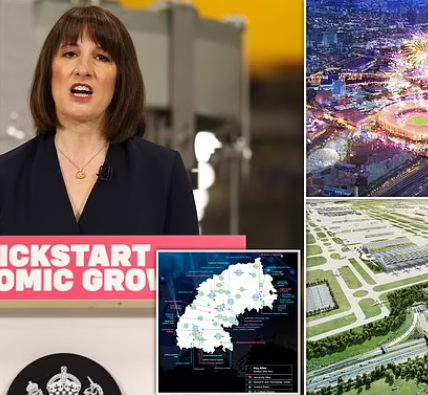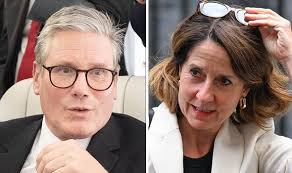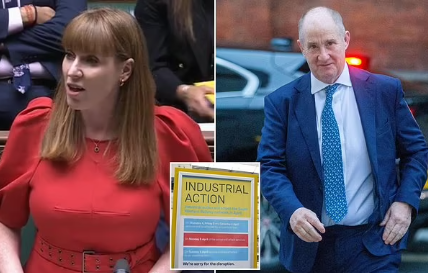Britain’s ‘new era of stagflation’: Inflation leaps to 3% under Rachel Reeves – its highest rate in 10 months – with Chancellor still scrambling for growth_Nhy
Britain was said to be at risk of a ‘new era of stagflation’ today after inflation leapt to 3 per cent in January to reach its highest level for 10 months.
The rate of Consumer Prices Index (CPI) inflation rose to 3 per cent last month from 2.5 per cent in December, the Office for National Statistics (ONS) said.
This was the highest level since March 2024, with plane fares, rising food costs and a jump in private school fees – after Labour imposed VAT on them – contributing to higher living costs.
The CPI rate for the 12 months to January was higher than predicted by analysts, who had forecast a rate of around 2.8 per cent.
It will represent a huge blow to Chancellor Rachel Reeves, who has faced huge questions over her stewardship of the economy since her Budget in October last year.
There will also be increased pressure on the Bank of England to consider further interest rate cuts in their bid to keep inflation around their 2 per cent target rate.
The Tories heaped blame for the rise in inflation on Ms Reeves’ tax-and-borrow package, saying Britons were ‘all paying the price’ for Labour’s action.
The Liberal Democrats condemned the Chancellor’s ‘misguided policies’ for leaving Britain at risk of a ‘new era of stagflation’ due to the UK’s sluggish economic growth.
Others said the country was heading for ‘stagflation-lite’, with 3 per cent inflation still ‘tolerably low’ compared to recent sky-high rates during the cost-of-living crisis.
Ms Reeves – who has faced fresh scrutiny this week about the accuracy of her CV – is under huge pressure ahead of her spring statement next month.
In order to keep within her ‘iron-clad’ fiscal rules, the Chancellor is likely to have to cut spending by more than she planned if she wants to dodge further tax hikes.
Amid stalling growth and spiking debt interest costs, Ms Reeves is believed to have seen the near-£10billion ‘headroom’ she built into her sums in October completely wiped out.
The Chancellor talks with leading investment bankers and asset managers today as part of her scramble to kickstart growth into the UK economy.

Transport costs – such as air fares and petrol prices – were among the biggest drivers of the higher rate of CPI inflation, which had stood at 2.5 per cent in December

The higher-than-expected rise in inflation will represent a huge blow to Rachel Reeves, pictured out running this week, who is facing huge questions over her stewardship of the economy
Commenting on the inflation figures, ONS chief economist Grant Fitzner said: ‘Inflation increased sharply this month to its highest annual rate since March last year.
‘The rise was driven by air fares not falling as much as we usually see at this time of year, partly impacted by the timing of flights over Christmas and New Year. This was the weakest January dip since 2020.
‘After falling this time last year, the cost of food and non-alcoholic drinks increased, particularly meat, bread and cereals.’
Tory shadow chancellor Mel Stride said: ‘Today’s inflation figures mean further pain for family finances – and it’s thanks to the Labour Chancellor’s record tax hikes and inflation busting pay rises.
‘Labour were warned that their tax spending and borrowing spree would drive up inflation.
‘It means higher prices in the shops, and interest rates staying higher for longer, causing mortgage misery for millions.
‘This Chancellor is out of her depth, and we’re all paying the price.’
Lib Dem leader Sir Ed Davey said: ‘The Chancellor’s misguided policies are putting us at risk of a new era of stagflation.
‘The economy still isn’t growing, and now people are being hit in their pockets too.
‘The Conservative Government plunged Britain into a cost of living crisis, and Labour’s failures are just making the misery drag on and on.
‘The Government urgently needs to change course and take real action to get our economy growing strongly and bring down the cost of living, starting by cancelling their disastrous jobs tax and securing a much better trade deal with Europe.’

The rate of CPIH inflation, which takes into account housing costs, also rose in the 12 months in January to reach 3.9 per cent
Julian Jessop, from free market think tank the Institute of Economic Affairs, said: ‘The jump in headline inflation to 3 per cent in January adds to evidence that the UK is heading for ‘stagflation’ – a nasty combination of stagnating economic activity, rising inflation, and increasing job insecurity.
‘This outbreak could still be mild by past standards, and so best described as ‘stagflation-lite’.
‘3 per cent inflation is still tolerably low, and there were some special factors last month including the volatility of air fares and some (hopefully) one-offs, including the extension of VAT to private school fees.’
He added: ‘Nonetheless, higher inflation will undermine two of the foundations of any recovery in consumer confidence and spending – rising real wages and hopes of further interest rate cuts.
‘The renewed increase in food price inflation will be particularly worrying for households on lower incomes.’
Ms Reeves said: ‘Getting more money in people’s pockets is my number one mission.
‘Since the election we’ve seen year on year wages after inflation growing at their fastest rate in three years – worth an extra £1,000 a year on average – but I know that millions of families are still struggling to make ends meet.’
In a round of TV and radio interviews this morning, policing minister Dame Diana Johnson described inflation jumping to 3 per cent last month as a ‘bump in the road’.
She told Sky News: ‘I’m going to say to you that we’ve only been in power seven months.
‘We’ve had 14 years of economic stagnation, so I think there’s obviously work that’s under way with the Chancellor.
‘But I know that the IMF and the OECD are saying that we’re going to have the fastest-growing economy in Europe.’



